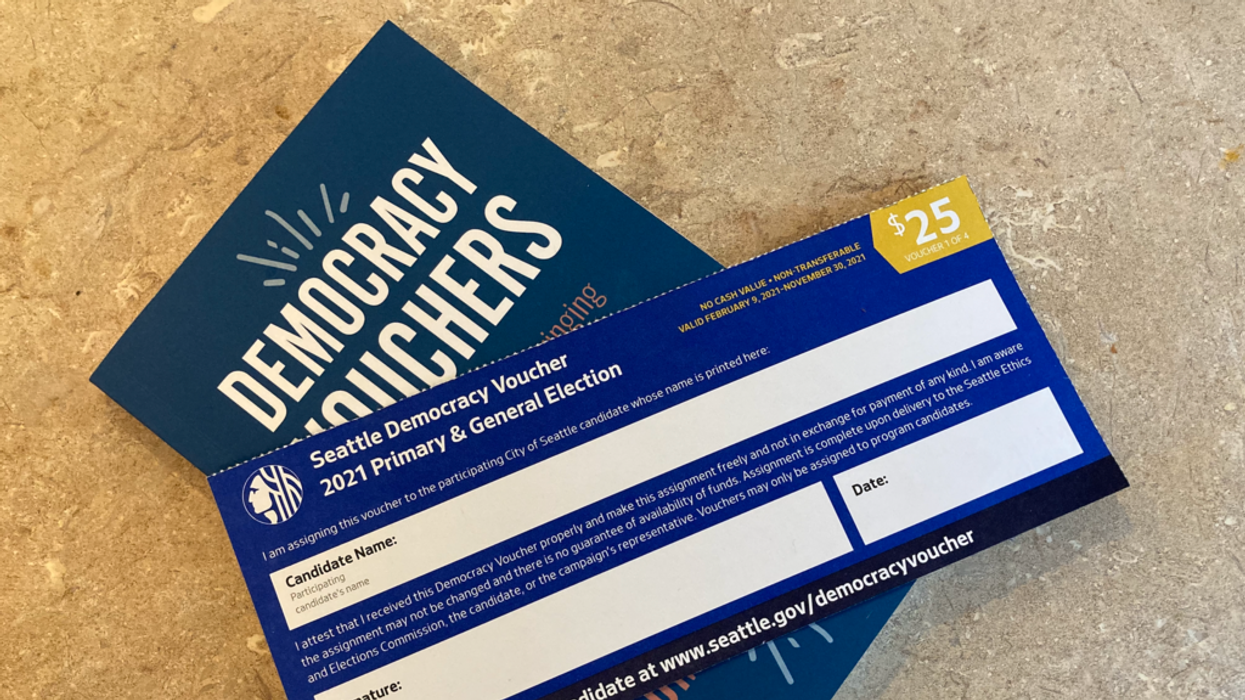In a political era dominated by billionaire-funded Super PACs, voter suppression efforts, and widening gaps in political participation, it’s easy to feel like our democracy is slipping further out of reach. But in Seattle, we’ve spent the last decade quietly building something remarkable: a program that gives everyday people real power in our elections.
Seattle’s Democracy Voucher Program is the first of its kind in the nation. And it works. Since its launch in 2017, the program has transformed how campaigns are funded, who runs for office, and who gets heard in our local elections. It’s become a powerful counterweight to the influence of big money in politics and proof that a different kind of democracy is possible.
On August 5th, Seattle voters will decide whether to renew the program by voting on Proposition 1. The outcome matters not just for our city, but for the national movement to build a democracy that’s more inclusive, more representative, and more resilient.
Here’s how the program works: Every Seattle resident receives four $25 vouchers they can donate to candidates running for local office. That means renters, low-income residents, young people – those who are typically left out of the campaign finance system – get a meaningful way to participate. And candidates no longer have to rely on maxed-out checks from wealthy donors to run viable campaigns.
The results have been striking. Since 2017, more than 100,000 people have used their vouchers to support local candidates – most of them first-time donors. The share of campaign dollars coming from big donors has plummeted, while small-dollar contributions have surged. And the candidate pool has diversified: more women, people of color, and first-time candidates are stepping up to run for office, often citing the Democracy Voucher Program as the reason they could.
This shift isn’t theoretical, it’s personal. I live in Hillman City, one of Seattle’s most racially and economically diverse neighborhoods, and I’ve spent much of my career working to strengthen democracy and community power. But I’m also a father raising two young boys. Like so many parents around the country, I’m deeply concerned about the direction of our democracy. From election denialism to the erosion of voting rights, the threats are real and growing. We need to be defending democracy at every level—from Washington, D.C. to our local city halls.
That’s why Prop 1 is so important. It would renew the property tax levy that funds the Democracy Voucher Program, ensuring it continues through 2035. For the average homeowner, the cost is about $13 per year. But the return on that investment? A local government that’s more accountable, more representative, and more engaged with the people it serves.
Other cities have already taken notice. In 2022, Oakland voters overwhelmingly approved their own “Democracy Dollars” program modeled after Seattle’s. Organizers in places like New Hampshire, Minnesota, and other California cities are watching closely. If Seattle’s program is cut or allowed to wither, it would send a chilling message: that even the most successful efforts to empower ordinary people in our political system aren’t safe.
But I believe we can choose a different path. We can show that when communities invest in democratic infrastructure, it pays off. We can push back against cynicism with concrete reforms that deepen participation and reduce the outsized influence of wealth. And we can make clear – to our children and our country – that local democracy still matters.
Seattle’s Democracy Voucher Program isn’t just a local innovation. It’s a national model. And this August, we have a chance to protect it.
Estevan Munoz-Howard is a democracy strategist, community and donor organizer with expertise in democracy reform, fundraising, grantmaking, and developing racially equitable organizational practices.




















Trump & Hegseth gave Mark Kelly a huge 2028 gift